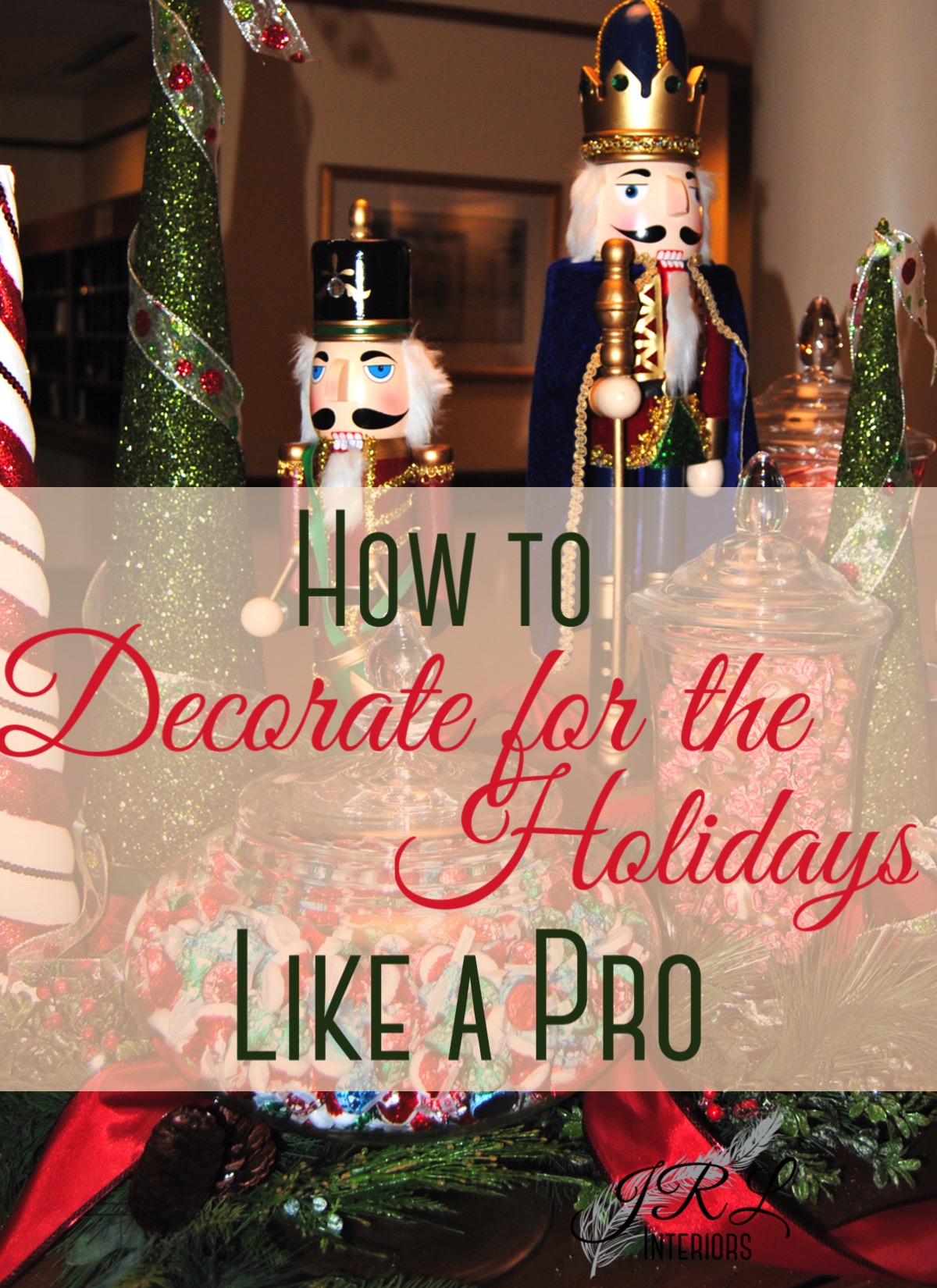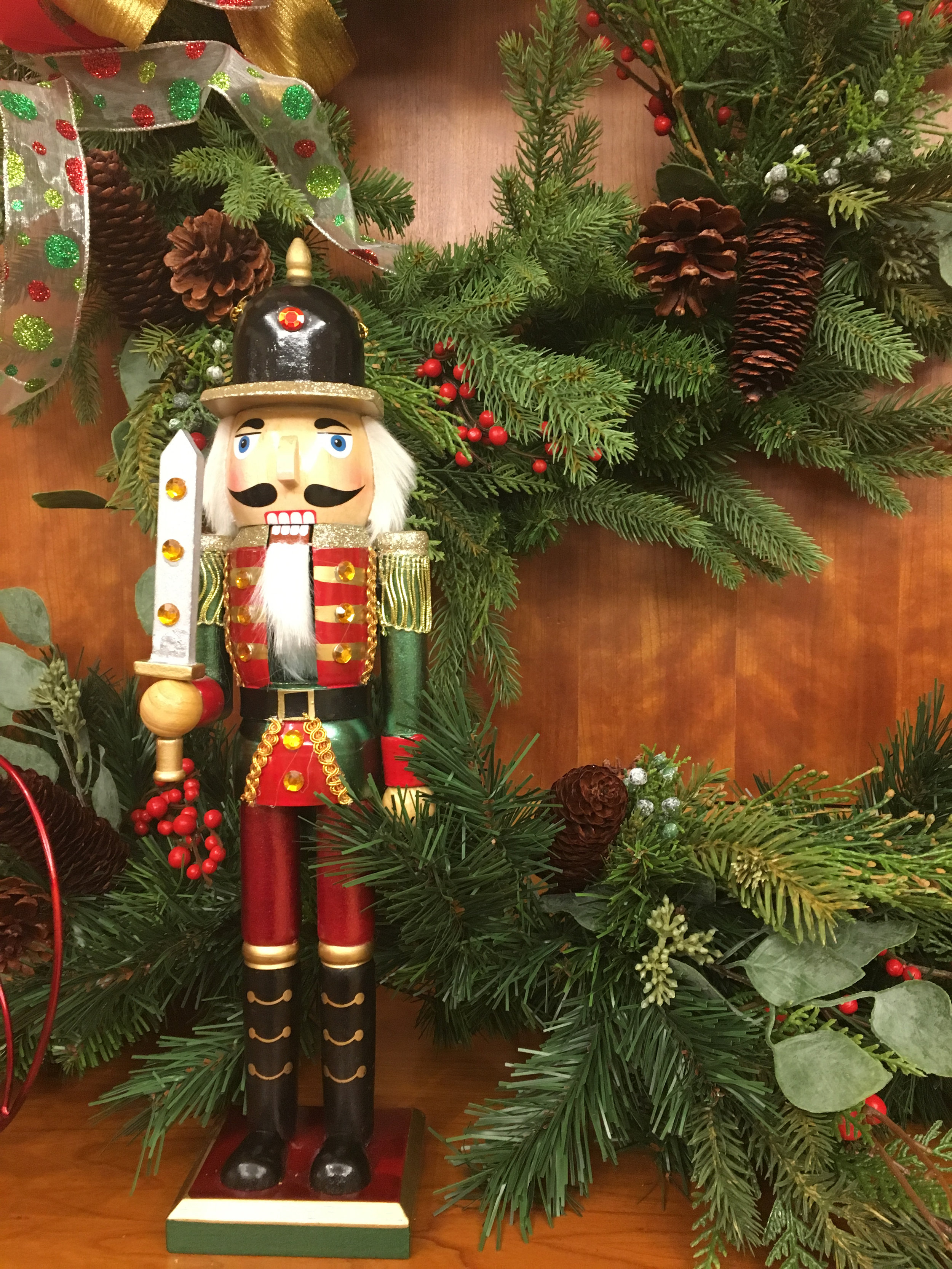Christmas Decorating by the Numbers
We did 3 commercial Christmas decorating projects this past week (I’ll share some more before and after photos in another post). We used 1200 yds of ribbon, installed over 230 ft of garland, decorated 15 wreaths, hung 7 oversize ornaments from the ceiling, did 6 table displays, decorated 4 mantels and installed and decorated 3 Christmas trees! Themes ranged from elegant winter wonderland to fun candy-themed displays. Each was tailored for the client and the particular space. While I am normally not a huge fan of glitter as it is kind of impossible to get rid of, it IS useful in Christmas decorating because it reflects the lights nicely….and after this week I am still finding glitter on everything (including me!)
This mantel got a faux green wreath and garland embellished with additional faux greens, pine cones, and berries. A sleigh filled with Christmas balls and an assortment of nutcrackers add just the right touch.
Winter tablescape with white and silver and evergreens
Here we share some tips from the pros for decorating your home for the holidays…
For faux Christmas trees, wreaths, and garland, fluff the greens before decorating – wear cotton or silky gloves to save yourself from getting all scratched up…Balsam Hill’s trees come with fluffing gloves LOL – our team thought this was the best thing ever!
Trees
When choosing a tree, keep in mind that the more tips it has, the fuller and more realistic it will look (and the pricier it will be). I don’t trust the lights on prelit trees to hold up more than a couple of years, so if you are buying a really nice quality tree, I‘d opt for unlit and add whatever kind of lights you prefer. Ballard offers some nice prelit trees (7.5’ w/ 4000 branch tips) and Balsam Hill offers a range of beautiful trees in various sizes and degrees of fullness (7.5’ w/ from 2700 – 5000 branch tips) and various light options as well as unlit. And Overstock and Amazon offer more affordable Dunhill lit and unlit trees (7.5’ w/ 2500 branch tips). NOTE: click on the brands listed above in bold for links to their trees.
Fluff from the bottom up, working around the tree and fluffing and shaping each branch from trunk to tip. PRO TIP: adding each tree section only as the previous one is fluffed makes it much easier to see what you are doing.
Next, if the tree is not prelit, add lights – 100 lights per foot of tree is a good rule of thumb – if you want the lights all the way to the inside and you are in the camp of “more is better”, you will need 200 lights per foot. Check the manufacturers info to see how many strands can be connected end to end (usually for 100 lights strands it is about 5). Install the lights by zig-zagging back and forth in sections starting at the top and working downward with the lights plugged in so you can see how evenly they are distributed. For an 8’ tree that is getting 800 lights, 4 sections with 200 lights per section works well. I personally am not a fan of LED lights. I find the standard white (blueish) ones are just depressing and the “warm” ones, while slightly better, are usually either slightly orange or an eerie yellow and don’t hold a candle (no pun intended!) to incandescent white lights – these are the best approximation of candlelight, which is the idea. But that’s just my bias. You do you!
The next step will be to add the ribbon – you can use a large bow at the top and trailing streamers in sweeping zig zag patterns tucked into the branches periodically, or a different topper or cluster of sprigs/twigs/feathers or other things followed by ribbon garland with or without periodic bows attached and applied similarly.
After whatever garland or ribbon you choose is added, add sprays of berries, branches, or leaves – gilded, silver, white, red, or snow-crusted/flocked, or glittered all show well against the green of the branches. Tuck the stem end into the tree and bend the spray branches so they are in the sort of organic shapes that would occur in nature.
Last, add ornaments. Be sure to include a variety of shapes, finishes, and sizes. Start with the largest ones first, dispersing them evenly, and work down to the smallest sizes. Many things can be ornaments - they don’t necessarily have to be sold as ornaments - I’ve used nutcrackers, sleighs, and even stuffed animals over the years as part of the tree decorations depending on the theme and location. I like to start with a quorum of color themed ribbon and larger ornaments to establish an overall look and then fill in with the smaller sentimental pieces. I also like to coordinate the look and colors on the tree with the décor in the room whenever possible for an elegant, cohesive feel. A base of white, silver and gold will mix with almost ANY décor scheme.
Finally, use a swath of coordinating fabric to disguise the base of the tree – an actual tree skirt is not really necessary. I have planted faux Christmas trees in large containers in lieu of skirting the base as well. Large baskets, planters, urns and decorative boxes could all work for this as long as the container is big enough to accommodate the tree stand - I use a gold and white paper mache drum for one of my own trees. Wrap your packages in coordinating colors/themes for a final finishing touch. PRO TIP: It occurred to me a few years ago to assign each family member a color of paper so I didn’t have to label the gifts with tags and hunt around under the tree for names! But gift wrapping is a whole OTHER post – you can read that HERE along with the secret to getting a bargain on fabulous ribbon!
Tree with gold, silver and peacock ribbon embellished with white and silver berry sprigs, aqua teardrop glass ornaments, a mix of matte, sparkly, and shiny teal balls, mercury glass ornaments in a variety of sizes and shapes, and champagne glass pinecone clusters
This tree and mantel got treated to a gold, silver and white winter wonderland look with snowflake ribbon and ornaments, gold, silver, and white ornaments in various shapes and sizes, and gold berry sprigs and white snowball berry branches
Garlands and Wreaths
If you are using faux garlands, fluff before using, obviously, but also consider adding a variety of other faux greens (or real cut greens if you like) wired to your garland. This will make it much fuller and more life like. Cedar, juniper sprigs, or pine branches are all good options to add to a fir garland. After that you can add pine cones (natural/white tipped/silver/gilded/glittered – depending on the look you want), and other branches, sprigs, and berries in whatever colors and finishes go with the remaining Christmas décor. Add lights after the garland is in place tucking them into the greenery in a zig-zag pattern rather than awkwardly wrapping them around it. Last, add bows, ribbon and any ornaments or embellishments.
A large wreath over a fireplace is embellished with peacock ribbon mixed with gold and silver ribbon, glittered cedar greens, and gold bird ornaments
A live exterior door wreath with gold and red accents and plaid and gold ribbons
Here we used the clients wreath, accessories, and greens. Adding only a base of evergreen garland and yards of ribbon we were able to restyle everything for a beautiful fresh look.
Railing garland in this atrium space was styled with alternating clusters of ornaments and lush bows
A Word About Bows
I am a total snob about bows. Scale is everything for making successful bows. Nothing looks cheaper than an anemic bow on a tree, wreath, or garland. Wired ribbon yields the best look because it can be shaped easily. We like to use at least 3 different kinds of 2 ½” wide ribbon – a mix of two solids or patterns and one sheerer ribbon for most bows. Sometimes we use 4 kinds of ribbon for larger scale bows. Medium size bows can be done with 6 triple loops for a flat diameter of about 16”- 18” before shaping. Larger bows (for say, a tree topper or a large scale wreath or garland) might need more loops or wider ribbon to look right. Large loops with too narrow ribbon even if it is wired tend to look kind of bizarrely droopy – so scale up the ribbon width for larger applications.
This newel post garland bow detail includes 4 different 2 1/2” wide wired ribbons: a pale blue w/ silver snowflakes, a semi-sheer silver, a semi-sheer gold, and a sheer with gold and silver stripes. There are 6 loops of each for a total of 24 loops.
These ethereal bows for the corners of archway garlands are comprised of three 2 1/2” wide sheer and semi-sheer ribbons. Each bow has 6 triple loops for a total of 18 loops.
Happy Holiday Decorating!
XO,
Janet
**Please note that this page contains affiliate links meaning that if you make a purchase, I might make a small commission at no extra charge to you.













